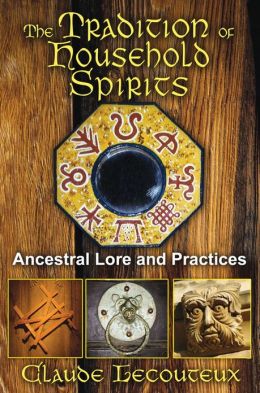
This book is one of a series by a French scholar and professor of medieval literature at the Sorbonne that are being translated into English by Jon Graham of Inner Traditions. Lecouteux’s books form a valuable corpus of material on old European traditions that would be otherwise inaccessible to American readers.
“The Tradition of Household Spirits” contains a wealth of research into the fascinating topic of spirits of the home. The sources Lecouteux quotes range from archaic Greek and Roman texts to interviews from the early 20th century. The bulk of the content is gathered from European texts from the 10th to 17th centuries. There are tidbits about Asian spirit practices for comparison. Relationships with household spirits at the opposite end of the land mass aren't as different as one might think.
The author proposes various theories about the origin of household spirits, their behaviors and relationships with the home dwellers. There are a myriad of examples of rituals to honor and placate these incorporeal beings. The author, for the most part, simply presents testimony from primary references, and makes very few theories or assumptions, but instead clarifies the salient point. Household spirits originate from the spirits of deceased family members or ancestors, dwindled deities from antiquity, and earth or place spirits that become attached to a home or family. Since many of these traditions emanate from rural regions all over Europe, Russia, and the Balkans, the book includes references to spirits attached to the outbuildings of farms, like barns, livestock sheds, and grain silos.
Although Europeans never codified anything as distinctive or complex as Feng Shui, the examples indicate a surprising degree of concern about the same basic issues that Feng Shui addresses in determining the acceptability of a building site, the orientation of doors, windows, and the placement of a hearth. Many of the records cited were penned by clerics writing in Latin, so some of the stories are a bit garbled from the Roman Catholic gloss and generic terms that erroneously equate household spirits with demons.
Household spirits have regional differences and slightly different roles. In Part One, the author discusses the types of spirits attached to a house, from the materials used for construction to special zones: the threshold, doors, windows, the hearth, dedicated altar corners, basements and attics. In Part Two, the wide range and origin of household spirits is explained. There are three appendices, endnotes, a bibliography, and an index.
This is a tremendously valuable book for Americans of European stock. Industrialization has uprooted people from family farms or homes occupied by succeeding generations. In the not-so-distant past, the home was a bastion of sacred space and numinous protection. It has been stripped of its numinous functions as economic pressures eroded familial geographic continuity and turned many people into rootless job-seekers. Contractors slap together new buildings with no regard for place spirits (genius loci) and without ritualized precautions once used in the selection of building materials and locations. Some of these construction rituals are still used in parts of Europe. If they were ever used in America, they've been lost and forgotten (unless the Amish or Mennonites still practice them).
The beliefs and practices of household spirits are devolved remnants of ancient pagan practices that persisted into the 20th century, especially in rural areas of Europe and out-of-the-way places like Estonia, Lithuania, Latvia, and hidden corners of the Balkans. This book is of great interest to contemporary pagans who have reconnected with various European pantheons.
Professor Lecouteax has compiled a revealing survey that demonstrates widespread and persistent pagan practices lurking beneath the Christianized veneer of the Caucasian continent. This book offers plenty of ideas of how to re-incorporate the traditions connected with household spirits into contemporary households.
Highly recommended!
~review by Elizabeth Hazel
Author: Claude Lecouteux
Inner Traditions, 2013
pp. 227, $16.95
